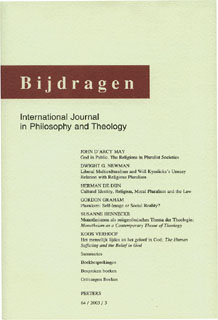 previous article in this issue previous article in this issue | next article in this issue  |

|
Document Details : Title: Geloof op zoek naar inzicht, niet naar bewijs - Faith Seeking Understanding, not Proof Subtitle: Een antwoord aan Rudi te Velde - An Answer to Rudi te Velde Author(s): SAROT, Marcel , VAN DEN BRINK, Gijsbert Journal: Bijdragen Volume: 60 Issue: 1 Date: 1999 Pages: 54-72 DOI: 10.2143/BIJ.60.1.2002340 Abstract : In Bijdragen 59 (1998) Rudi te Velde argued that our appeal to St. Anselm in elucidating the tenets of the ‘Utrecht school’ in philosophical theology is unjustified, because of a presumed anti-realist tendency in our thinking. In our reply we point out that this accusation is the result of a confusion between the disciplines of philosophical theology and religious epistemology. Philosophical theology accepts from an insiders-perspective belief claims which are not directly accessible to reason or observation – such as the claim that God exists. From the fact that the Utrecht philosophical theologians do not attempt to prove these claims, but interpret them as the constitutive presuppositions of the Christian form of life, it does not follow that they doubt their truth. On the contrary, in quite a number of writings representatives of the Utrecht school have insisted on a realist reading of the belief claims of the Christian faith. Our realism goes even further than Te Velde’s. According to Te Velde our religious language is inadequate to such an extent, that it doesn’t enable us to give correct descriptions of reality. We show that this view necessarily leads to agnosticism. Next, as to religious epistemology we point out that since the collapse of foundationalism realists as well as others have reasons to be suspicious of attempts to prove the existence of God. In any case, we don’t needto prove such belief claims in order to be intellectually entitled to accept them – which is not to say that arguments for the existence of God have no value at all. Finally, it is precisely this complementarity of philosophical theology and religious epistemology which we find supremely exemplified in Anselm’s Proslogion. Whether one interprets the ontological argument as functioning sola ratione, i.e. independently of faith in God, or rather as functioning within the framework of the faith seeking understanding programe, the main part of the Proslogion’s ‘single argument’ is devoted to philosophical theology in the sense advocated and illustrated by the Utrecht School, i.e. to the search for insight into the reality and the attributes of God rather than for proof. |
